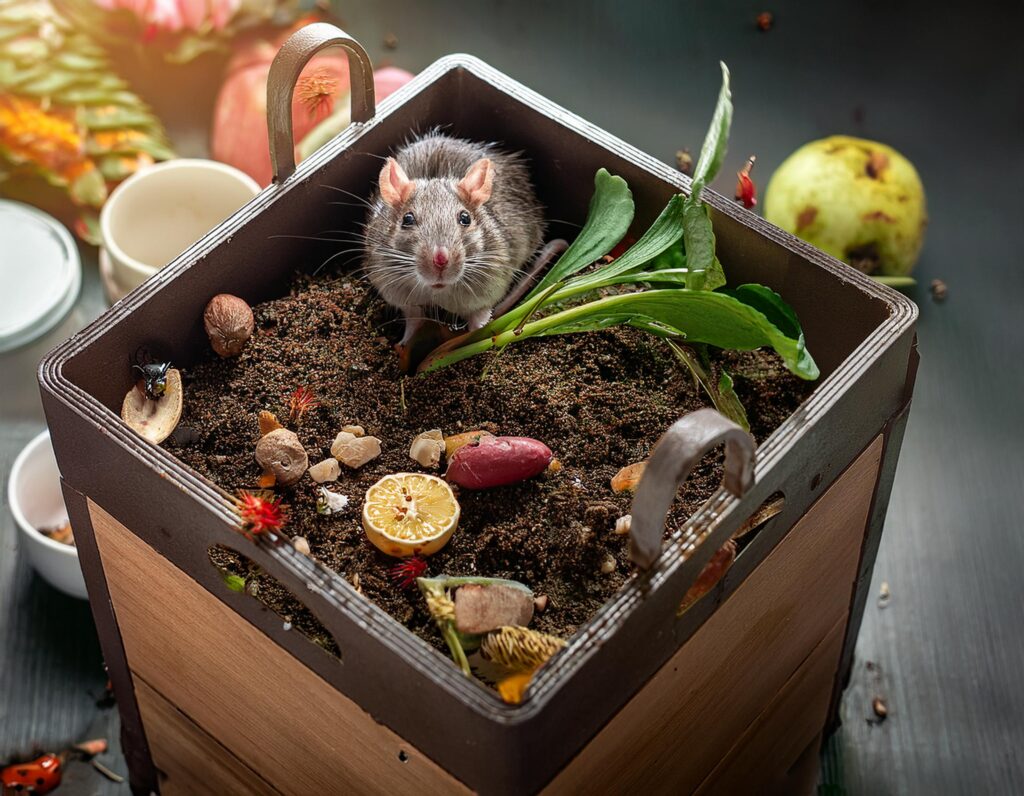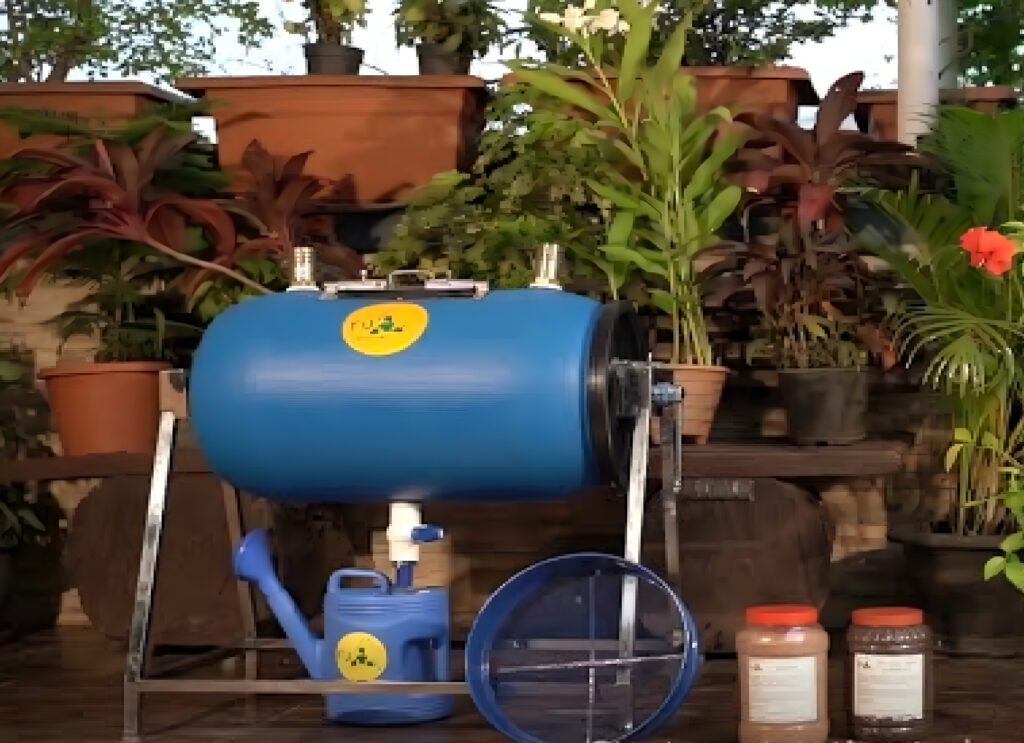We now live in a world of growing global waste problems and environmental concerns. Landfills are overflowing releasing harmful toxic gasses into the atmosphere also turning into breeding grounds for all kinds of diseases. Additionally, the shift to synthetic artificial fertilizer is resulting in degrading soil health. Recognizing these concerns I took it upon myself to do my part, I wanted to make an effort, I decided to start composting my organic kitchen waste.
Composting helps by diverting organic waste from landfills, reducing greenhouse gasses, and creating nutrient-rich soil that supports sustainable agriculture. The advancement of technology and industrialization has led to an overwhelming number of choices for almost any task. When it comes to composting, there are two primary methods that often compete with each other: Bin Composting – a bin setup is used to create compost and Tumbler Composting – a rotating container setup is used to create compost.

Being new to composting, I initially started with Bin Composting seeing that it was less expensive. However, I soon lost the motivation. It was quite difficult for me to keep up with the composting, move the contents inside the bin, additionally it used to smell quite a bit and attract a lot of fruit flies. When I told this to my colleague who’s a gardening enthusiast, she told me to take a look into tumbler composters. Though I was skeptical initially, the investment was totally worth it. The success of my tumbler composter prompted me to write this blog so that beginners in composting would not make the same mistakes that I did and realized why a tumbler composter might be the superior choice.
Here’s why I think tumbler composters might be better than traditional bin composters:
- Quick Composting
When I started to look into composting I realized it is a long and tedious process but the rotation mechanism in the composter helps with aeration and speeding up decomposition. Where traditional bins take months to create compost, tumblers create compost in a matter of weeks. The ability to speed up the composting process is one of the main reasons for the popularity of the tumbler composter.
- Less Effort
Bin composting can be labor-intensive, especially when it comes to turning and mixing. With a tumbler, you don’t have to rely on manual turning with a pitchfork or shovel. The design of these composters allows you to easily rotate them, making mixing a breeze. This reduces physical strain and makes composting a more accessible and enjoyable process. I just rotate the tumbler few times a week and I am assured to get a good quality compost
- Space Efficiency
Because I have a smaller garden, a tumbler composter is a great fit. Its compact design allows it to fit neatly into smaller areas, without compromising on functionality. I do not require a big yard to compost!
- At last, NO MESS
When I composted using the bin method the waste used to fall outside the lid while mixing and create a mess. My tumbler composter keeps the compost contained within the unit, almost eliminating the mess around it. This makes maintaining cleanliness easier and can help keep your garden or house looking neat.
- No bad smell
Good aeration is crucial for aerobic decomposition. The enclosed, rotating design of a tumbler ensures that your compost gets ample airflow. A well aerated compost helps in maintaining the right pH balance making the compost pile almost odor free. Better aeration means a more efficient composting process. There is a significant difference in the odor between the bin composter and my tumbler.
- Improved temperature moisture and contamination control
I can maintain consistent temperatures in the tumbler as the enclosed environment helps retain heat, this helps in accelerating the rate of decomposition. Tumblers also allow for better drainage, preventing water logging and maintaining correct moisture levels to aid in composting. Furthermore, since the tumbler is a closed environment it is very unlikely to get contaminated by external factors, ensuring a healthy compost.
- Uniform Compost quality
A tumbler thoroughly mixes all the waste inside it, this ensures a more consistent end result. The compost has the same texture throughout unlike beds where the compost can have different texture depending upon the action of the bed or the bin. The tumbling also prevents compaction – which can slow down the rate of decomposition – rather keeps the compost nice and loose.
- No Pests
When I had the bin composter it used to attract a lot of flies but my tumbler is elevated, has a tight seal and is almost odor free. Tumblers do not attract any pests like rodents and insects. These critters can create a nuisance and best to be kept away. The less odor also aids in keeping flies and rats away.
- Aesthetic and Portable
When I was buying the composter I was worried about how the composter would fit into my garden. Tumbler Composters are modern and tidy keeping your garden and house looking nice and tidy. Tumblers usually have stands and bases making them portable.

In conclusion, Tumbler composters offer numerous advantages over traditional bin and bed composters, right from reduced manpower and a cleaner operation to better aesthetics. If you are looking for an efficient, user friendly, modern, odorless, pest free and revolutionary composting solution investing in a tumbler composter is the way to go. Ditch those traditional bins and beds, switch to a composter that will make your life hassle free, sustainable and rewarding all while making our environment more green and clean, switch to Tumbler Composting.
| Features | BIN | RUR Tumbler Composter |
| Composting Speed | Slower decomposition | Accelerated Composting |
| Ease of Rotation | Manual turning required, labor-intensive | Easy Rotation |
| Space Efficiency | Requires more space | Ideal for residents or townships, resorts/hotels |
| Cleanliness | Potential for spillage and mess | Cleaner Operation, No mess |
| Aeration | Poor airflow, can lead to anaerobic conditions | superior aeration, presence of air vents |
| Odor Control | May develop unpleasant smells | Odourless composting |
| Temperature & Moisture Control | Lacks proper regulation, leads to inconsistencies | Improved temperature moisture and contamination control |
| Compost Quality | Inconsistent compost quality | Uniform Compost quality |
| Pest Resistance | Prone to pest infestations | No Pests, due to sterilisation |
| Aesthetic Appeal | Bulky, unattractive | Aesthetic and Portable |
| Leakage & Spillage | Likely to leak, leading to mess and attraction of pests | No Leakage involved |